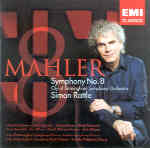Obviously, EMI wanted this recording to complete its Rattle Mahler cycle–heaven knows why, because it’s the least interesting, least insightful, most poorly played and worst-recorded of all recent Mahler cycles. There is an excellent one in EMI’s archives, though I doubt that anyone there knows about it or cares: Bertini’s WDR cycle (the Eighth especially outstanding), half of which was reissued at budget price by EMI France. Not a single one of Simon Rattle’s performances, save his Berlin recording of the Tenth, stands among the top recommendations in this music–which doesn’t mean that they are terrible. Most are merely mediocre. This new Eighth is better than that, a decent professional job that anyone attending a subscription concert in Birmingham would have found very enjoyable. It’s just not competitive with the finest versions already available.
Start with Rattle’s conception of the piece. He doesn’t really have one, other than to get it over with as quickly as possible. He launches the first movement very excitingly, and all goes reasonably well through the central double fugue. But if you compare the way Rattle handles the tempo adjustments within this section to the recent Nagano on Harmonia Mundi, you will clearly hear that everything Rattle tries to do (the slow-down at the soloists’ entry at “Per te sciamus”; the big ritard after the first cymbal crash) Nagano simply does better. The moment of recapitulation, which doesn’t seem quite to get back to Tempo I, is a non-event, and the final pages are mercilessly rushed, making a mess out of those thrilling rising scales at the very end, a moment that should send a chill down your spine. Instead, you may well find yourself wondering what all the yelling was about.
The second movement is efficient, opening with a Poco adagio singularly lacking in mystery. When the chorus reenters, the “echo” is as loud as the principal voices (again, compare to Nagano). None of the male singers strikes me as outstanding in any way: David Wilson-Johnson sounds strained in his brief baritone solo, John Relyea makes a gravelly-voiced Pater profundus, and Jon Villars, something of a Mahler specialist, hasn’t the vocal heft or ease of production that Dr. Marianus ideally requires. The women do a better job, with Soile Isokoski a decent Gretchen, though Juliane Banse (as recorded here, too closely) makes a pretty strident Mater Gloriosa. The choirs sing accurately but with little audible feeling for the text, and the sonics are two-dimensional, with the soloists artificially spotlit.
In short, this live recording, though sensible to a fault and faithful to the notes, reveals little sense of occasion or special feeling for the work. I have no problem giving everyone concerned credit for a good, well-intentioned effort, but this of all symphonies needs to sound like a major event, not just another pleasant concert night out.
































